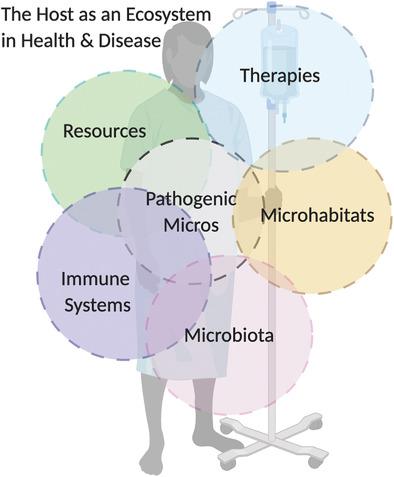Our official English website, www.x-mol.net, welcomes your
feedback! (Note: you will need to create a separate account there.)
Fighting microbial pathogens by integrating host ecosystem interactions and evolution
BioEssays ( IF 3.2 ) Pub Date : 2020-12-30 , DOI: 10.1002/bies.202000272 Alita R Burmeister 1, 2 , Elsa Hansen 3 , Jessica J Cunningham 4 , E Hesper Rego 5 , Paul E Turner 1, 2, 6 , Joshua S Weitz 7, 8 , Michael E Hochberg 9, 10
BioEssays ( IF 3.2 ) Pub Date : 2020-12-30 , DOI: 10.1002/bies.202000272 Alita R Burmeister 1, 2 , Elsa Hansen 3 , Jessica J Cunningham 4 , E Hesper Rego 5 , Paul E Turner 1, 2, 6 , Joshua S Weitz 7, 8 , Michael E Hochberg 9, 10
Affiliation

|
Successful therapies to combat microbial diseases and cancers require incorporating ecological and evolutionary principles. Drawing upon the fields of ecology and evolutionary biology, we present a systems‐based approach in which host and disease‐causing factors are considered as part of a complex network of interactions, analogous to studies of “classical” ecosystems. Centering this approach around empirical examples of disease treatment, we present evidence that successful therapies invariably engage multiple interactions with other components of the host ecosystem. Many of these factors interact nonlinearly to yield synergistic benefits and curative outcomes. We argue that these synergies and nonlinear feedbacks must be leveraged to improve the study of pathogenesis in situ and to develop more effective therapies. An eco‐evolutionary systems perspective has surprising and important consequences, and we use it to articulate areas of high research priority for improving treatment strategies.
中文翻译:

通过整合宿主生态系统的相互作用和进化来对抗微生物病原体
对抗微生物疾病和癌症的成功疗法需要结合生态和进化原理。利用生态学和进化生物学领域,我们提出了一种基于系统的方法,其中宿主和致病因素被视为复杂相互作用网络的一部分,类似于对“经典”生态系统的研究。以这种方法围绕疾病治疗的经验示例为中心,我们提供的证据表明,成功的治疗总是与宿主生态系统的其他组成部分进行多重相互作用。许多这些因素非线性地相互作用以产生协同效益和治疗结果。我们认为,必须利用这些协同作用和非线性反馈来改善原位发病机制的研究并开发更有效的疗法。
更新日期:2021-02-19
中文翻译:

通过整合宿主生态系统的相互作用和进化来对抗微生物病原体
对抗微生物疾病和癌症的成功疗法需要结合生态和进化原理。利用生态学和进化生物学领域,我们提出了一种基于系统的方法,其中宿主和致病因素被视为复杂相互作用网络的一部分,类似于对“经典”生态系统的研究。以这种方法围绕疾病治疗的经验示例为中心,我们提供的证据表明,成功的治疗总是与宿主生态系统的其他组成部分进行多重相互作用。许多这些因素非线性地相互作用以产生协同效益和治疗结果。我们认为,必须利用这些协同作用和非线性反馈来改善原位发病机制的研究并开发更有效的疗法。











































 京公网安备 11010802027423号
京公网安备 11010802027423号